Helpathons
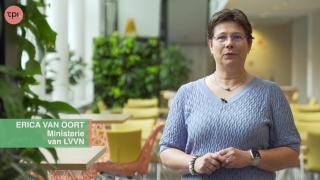
Questions
HelpathonsPolicyBeginner
Helpathon #12 – Can you help Erica?
We are inviting Dutch-speaking citizens from all walks of life to join a unique Helpathon and help Erica van Oort, coordinator of the Animal-Free Transition Program (TPI) in the Netherlands. No prior knowledge of animal testing is required—your fresh perspective can help Erica communicate more effectively about animal-free research.
We strongly believe that well-informed citizens are key to improving democratic policy-making on health research, with and without animals. Please share this invitation to at least one suitable person who could contribute—and of course, you are warmly welcome to join as well.
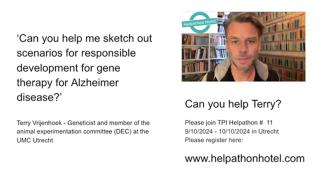
Questions
HelpathonsHealth
Helpathon #11 – Can you help Terry?
Terry Vrijenhoek (UMC Utrecht) is a geneticist and explores the societal impact of gene therapy. In this Helpathon the focus is on Alzheimers, for which there is no cure but there is a promising RNA-based therapy in the pipeline. Can you help Terry with designing scenarios for responsible development for gene therapy for Alzheimer disease in terms of benefits, risks, budgets and animal models? More information can be found here (https://www.helpathonhotel.org/coming-up).
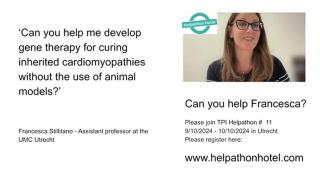
Questions
HelpathonsHealth
Helpathon #11 – Can you help Francesca?
Francesca Stillitano (UMC Utrecht) is a geneticist and an Assistant Professor at the Department of Cardiology. Francesca is currently working with mice models and with human tissue-based in vitro models to develop and test new gene therapies for a rare cardiomyopathy. Can you help Francesca with developing gene therapies for curing inherited cardiomyopathies without the use of animal models? More information can be found here (https://www.helpathonhotel.org/coming-up).
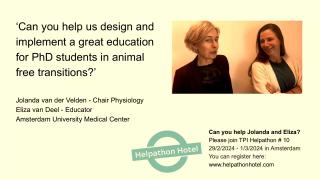
Questions
HelpathonsEducation
Helpathon #10 – Can you help Jolanda and Elza?
Jolanda van der Velden, Chair of Physiology, and Elza van Deel, Educator, from Amsterdam University Medical Center want to support PhDs in preparing for the animal-free transition. They are both looking for an implementation strategy and course design. Do you have an interest in animal-free education and education about animal-free research? Read more and register here (https://www.helpathonhotel.org/coming-up).
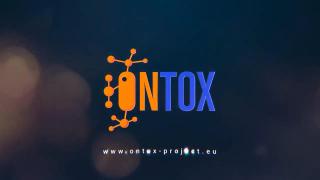
Meetings & conferences
HelpathonsHealthToxicologyIn silico
ONTOX Hackathon: Hack To Save Lives And Avoid Animal Suffering
Artificial Intelligence (AI) in toxicology – a potential driver for reducing or replacing laboratory animals in the future. ONTOX project is looking for solutions and innovative ideas to move forward. Are you going to help ONTOX to hack into these complex challenges?
The hackathon will be held from 21 to 23 April 2024 in Utrecht Science Park. The whole event is open to a diverse community of forward-thinkers and problem-solvers interested in the intersection of AI and ethical toxicology. The goal is to bring together passionate individuals who seek innovative solutions to critical challenges in toxicology.
Read more about the hackathon and register here (https://ontox-project.eu/hackathon/).
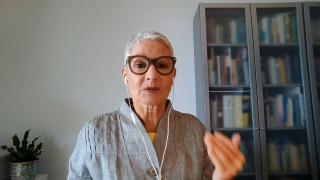
Expert interviews
HelpathonsPolicy
Monique Janssens: Why we need the Transition towards Animal-free Innovations
Why is there a Transition towards Animal-free Innovations, while we have the 3Rs, including Replacement? Well, there is a difference. Animal experiments should no longer be the golden standard of reference. We should not ask: Is this animal-free method good enough to replace animal experiments? But: What is the research question, and how do I get the best answer, preferably without animals? I know that many researchers are doing this already. But we can do even more! It’s also about involving the full chain of parties, including patients, financers, legislators and companies. That is why the transition movement works with interdisciplinary networks and Helpathons. The transition helps to innovate, to accelerate and to implement. At the same time, there is no need to throw the 3Rs overboard. Actually, we owe applying them to the lab animals of today. But by innovating we can develop even more new practices in research and education that bring about better results for science in less time and often with less costs. Without using animals.
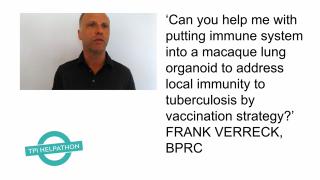
Questions
HelpathonsHealth
Helpathon #4 - can you help Frank?
Can you help Frank with integrating an immune system into a macaque lung organoid to address local immunity to tuberculosis with his vaccination strategy?
Join Helpathon #4, look at www.tpihelpathon.nl/coming-up !
Frank Verreck does research on tuberculosis at the Biomedical Primate Research Center (BPRC). Tuberculosis is the most deadly infectious disease worldwide! For the past hundred years, BCG (Bacillus Calmette Guérin) vaccinations take place through the skin. Research shows that macaques can be better protected from this infection by vaccination through their lungs. Frank really wants to further study the potential of this alternative vaccination strategy. He wants to understand how this BCG vaccination works in macaques lungs.
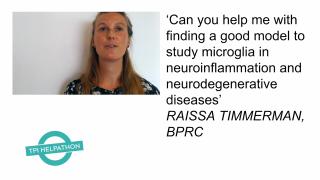
Questions
HelpathonsIn vitro
Helpathon #4 - can you help Raissa?
Can you help Raissa find a more complex organoid-like brain and immune model based on rhesus microglia to study aging in relation to neuroinflammation and neurodegenerative diseases?
Join Helpathon #4, look at www.tpihelpathon.nl/coming-up !
Raissa Timmerman is a PhD student at the alternative unit at the Biomedical Primate Research Center. A better understanding of aging of the brain is key to studying neuroinflammation and neurodegenerative diseases. We believe there is a potential for breakthrough in using our existing live macaque data obtained from past aging experiments to develop more complex in vitro rhesus brain-like models and then to correlate all this data with data from human in vitro models and human live data.
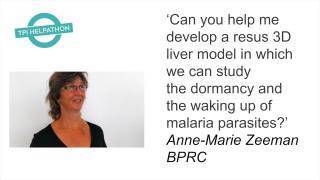
Questions
HelpathonsIn vitro
Helpathon #4 - can you help Anne-Marie?
Can you help Anne-Marie develop a more organ-like Rhesus 3D liver model in which she can study the dormancy and the waking up of malaria parasites?
Join Helpathon #4, look at www.tpihelpathon.nl/coming-up !
Anne- Marie Zeeman is a researcher at the Biomedical Primate Research Center (BPRC). Anne-Marie studies recurrent malaria ( P. vivax). She successfully developed a single cell layer in vitro model to study compounds affecting dormant and active malaria parasites in the liver of Rhesus monkeys. We believe that the cross correlation between in vitro Rhesus and in vitro human models will provide the missing link required to improve the drug development process and aid transition. A more refined Rhesus in vitro model can reduce the number of monkeys currently used for testing drugs. The data from in vivo monkeys combined with new in vitro models could help validate and develop reliable human in vitro models making testing on monkeys unnecessary detours.
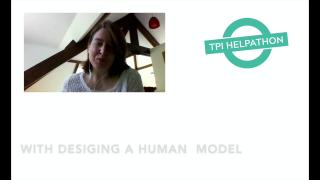
Questions
HelpathonsHealth
Helpathon #3 - Can you help Saskia?
Saskia van Mil calls for a Helpathon! She invites you to help her develop a human model for studying liver metabolism? You can sign in for this Helpathon here: tpihelpathon.nl. Online, 18th - 19th of June 2020.
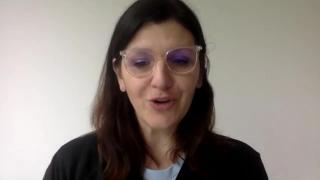
Questions
HelpathonsEducation
Helpathon #3 - Can you help Daniela?
Daniela Salvatori calls for a Helpathon! She invites you to help her and TPI Utrecht to create a unique master course for animal free innovation. You can sign in for this Helpathon here: tpihelpathon.nl. Online, 18th - 19th of June 2020.
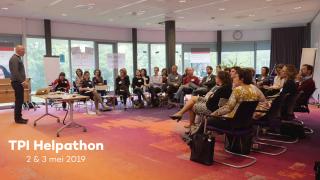
Questions
HelpathonsHealth
Helpathon #2 - Can you help Ilze and Bram?
Developing and validating a vaccine against atherosclerosis in humans takes a long time; can Bram and Ilze accelerate this by using animal-free alternatives?